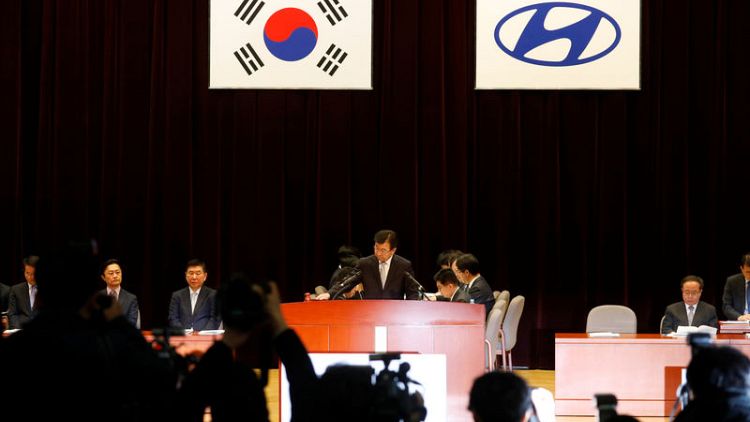By Hyunjoo Jin and Ju-min Park
SEOUL (Reuters) - Investors in Hyundai Motor Group companies rejected on Friday Elliott Management's demands for a massive special dividend and board seats, dealing a blow to the U.S. hedge fund's campaign to shake up South Korea's second-biggest family-run conglomerate.
Elliott's loss in a series of closely watched votes is also a setback for shareholder activism more broadly in Asia's fourth-largest economy, long dominated by powerful elites accused of taking minority investors for granted.
Activist investor Paul Singer’s fund successfully led a campaign against Hyundai's ownership restructuring plan last year, but failed to convince other shareholders on Friday that the group should pay out excess cash and bring in more independent directors to improve governance and accountability.
Its demand for a steep increase in dividend - more than six times higher than what Hyundai had offered - was rejected by other minority shareholders on the grounds that the automaking group needed to lift investment at a time of plunging profit.
"The dividend proposed by the shareholder (Elliott) may sound tempting, but in the long term, it is like a poisoned chalice or nothing but cutting open the belly of a goose with the golden eggs," Hyundai Motor shareholder Na Hong-seob told investors at the automaker's annual general meeting in Seoul.
Elliott had been trying to rally shareholder support for dividend payouts from Hyundai Motor and Hyundai Mobis for 2018 worth a combined 7 trillion won (£4.7 billion).
It also wanted a total of five board nominees at Hyundai Motor and Hyundai Mobis to address "governance shortcomings", citing investments in non-core assets such as a $10 billion land acquisition in Seoul's Gangnam business district.
"Today’s AGM is never a place for a battle between Elliott and Hyundai Motor Group. (It's) a place to give an opportunity for all shareholders to ... set a new standard," Choi Joon-ho, a representative of Elliott, said at the Hyundai Mobis meeting.
Hyundai Motor and Hyundai Mobis proposed 2018 dividend payouts of about $1 billion, as the group vowed to spend its vast cash reserves on boosting returns through acquisitions and new technology such as self-driving cars.
"The auto industry is expected to see a tough year ahead as falling demand in the United States, a major market, and stalling growth in China and Europe remain," Hyundai Motor Chief Executive Lee Won-hee told shareholders.
Hyundai Motor's share price fell by about a quarter last year, and while it has showed some improvement in 2019 the company's outlook remains bleak following six consecutive years of falling net profit.
The conglomerate still faces the bigger challenge of revamping its ownership structure, a process which is attracting close scrutiny from Elliott and other investors amid a government-backed push to curb the power of South Korea's dominant family-run business empires.
As of November, Elliott held more than 2.5 percent of common stock in Hyundai Mobis, 3 percent in Hyundai Motor and 2.1 percent in affiliate Kia Motors.
Shares of Hyundai Motor fell 0.4 percent while Hyundai Mobis shares gained 0.9 percent in a flat wider market.
(Reporting by Hyunjoo Jin and Ju-Min Park; Editing by Miyoung Kim and Stephen Coates)



